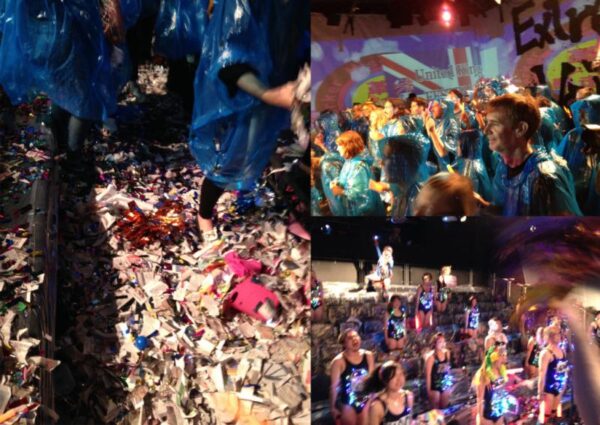The second slice of a three-part series from composer Neil Luck, on performance, politics, and the possibilities of the colloquial.
It’s problematic, being an artist right now. Natural ambitions towards international ‘expansion’ often feel at odds with an increasing public and political sway towards reestablishing borders and divisions.
I want to draw attention to artworks that represent fascinating models of a kind of ‘radical colloquialism’. Perhaps in explicitly local forms and languages we can find models of art making that begin to connect global audiences in surprising ways.
Miss Revolutionary Idol Berserker
“…June 2018 at the back of a tiny bar in Tokyo the barman is shouting the menu at me over a megaphone & the DJ-director is playing sped-up hyperactive J-Pop tracks over distorting speakers rainbow-clad waiter-performers make machine-gun conversation selling karaage fried chicken+postcards I have to crane my neck to watch a DVD of an insane stage show in Rotterdam and audience sing + dance along it’s hard to concentrate on anything >>> new member gives a sort of nanori inauguration speech [like in Kabuki] lights shut off & we’re blasted by super-intense 6 people right in our faces impossibly tight screamed karaoke choreographed glowstick routines like sugar-high militant pop-idol cheerleaders chased out of the bar by DJ-director furiously scribbling notes & we’re drunk and one of the waitresses auctions off her kimono…”
Video by Neil Luck
Even in all its unhinged mayhem though, this informal fan meet-up I found myself at offered only a glimpse of Miss Revolutionary Idol Berserker’s (MRIB) full-on, dialled-up-to-11 stage shows.
Founded and directed by Toco Nikaido, MRIB make dense, noisy, hyper-speed, and outrageously baffling music theatre spectacles. Assembled from a panoply of references to Japanese youth subcultures, they transform idols, revolutionary political imagery, Kabuki theatre, fan-made dance routines and food-fights into a wild and perfectly rehearsed mayhem. 30 or so bellowing ‘triple-threat’ performers are deployed simultaneously onstage, climbing amongst the seating, or throwing buckets of water, seaweed, and tofu from the sidelines.
It’s not immediately obvious, then, why international audiences should find this inscrutably colloquial work as appealing as they do. But MRIB’s sold out runs across Europe and Australia have garnered them major profiles in dance and theatre press, and a host of rave (but totally bewildered) reviews. I love Time Out London’s 4-star response to their production at LIFT 2016:
Er. Look. I’m going to level with you. I could pretend I knew what the hell was going on in this frankly bewildering Japanese show… But the honest truth is, I have absolutely no fucking idea.
Images, songs, and performance styles otherwise inextricably ‘Japanese’ are layered, combined and distorted so violently that they’re decoupled from their original meanings almost completely. MRIB force us into a 4D state of inattention where we’re unable to parse, or even recognise what’s happening around us.
But it’s in the eye of this overwrought, disorientating storm that the work finds broad resonance. Like GIFs uploaded, downloaded, compressed, reframed and shared over and over in an endless semiotic stream of contexts, navigating an MRIB show requires you to re-author what you see and hear, desperately synthesising it into some kind of ‘total experience’. The gnomic alienness of their references to “Life Size Tokyo Youths” only helps us to discard the weight of any metadateral baggage.
Exacerbating this, we, the audience, become complicit in what artist and thinker Hito Steyerl describes as a “swarm circulation” of content. Giant Youtube, Twitter and Instagram icons, held-aloft, implore us to share videos and photos freely online, actively curating our own individual flight-paths through the maelstrom. It’s largely through the proliferation of these inevitably distorted “poor images” that MRIB’s work reaches the wider world. Here are my attempts – suitably blurred, oddly framed and over saturated:

LIFT Festival 2016 | photos by Neil Luck
Underlining everything, Nikaido has commented that she regards the audience as the real stars of her theatre, and at the end of each show in a gesture of quintessential omotenashi hospitality we’re invited onstage as the cast swap places to occupy the rows of seats. The fans ultimately reclaim possession of the show and all its ‘meanings’, standing dazed amongst the detritus of the previous 30 minutes…

LIFT Festival 2016 | photos by Neil Luck
What’s striking is how such an explicit celebration of localised cultures is presented without any apparent ego. There’s no precious ownership here, no closed borders. Music theatre becomes a torrential free-exchange of material, cultures and histories. It’s this importing, exporting, translation, and wilful misinterpretation that makes Miss Revolutionary Idol Berserker’s performances so powerful; rendering them a super-welcoming, mega-disorientating, hyper-universal, and bloody entertaining gift.
Miss Revolutionary Idol Berserker present their latest show in Tokyo from 10th-16th July.
Neil Luck is a composer, performer, and director based in London. His music engages the physical and fallible nature of live performance in multimedia contexts, and attempts to frame the act of music making itself as something strange, useful, or spectacular in and of itself. He runs the performance group ARCO.


